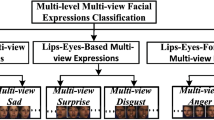Abstract
Facial-expression data often appear in multiple views either due to head-movements or the camera position. Existing methods for multi-view facial expression recognition perform classification of the target expressions either by using classifiers learned separately for each view or by using a single classifier learned for all views. However, these approaches do not explore the fact that multi-view facial expression data are different manifestations of the same facial-expression-related latent content. To this end, we propose a Shared Gaussian Process Latent Variable Model (SGPLVM) for classification of multi-view facial expression data. In this model, we first learn a discriminative manifold shared by multiple views of facial expressions, and then apply a (single) facial expression classifier, based on k-Nearest-Neighbours (kNN), to the shared manifold. In our experiments on the MultiPIE database, containing real images of facial expressions in multiple views, we show that the proposed model outperforms the state-of-the-art models for multi-view facial expression recognition.
Access this chapter
Tax calculation will be finalised at checkout
Purchases are for personal use only
Preview
Unable to display preview. Download preview PDF.
Similar content being viewed by others
References
Pantic, M., Nijholt, A., Pentland, A., Huanag, T.: Human-centred intelligent human? computer interaction (hci2): how far are we from attaining it? IJAACS 1, 168–187 (2008)
Vinciarelli, A., Pantic, M., Bourlard, H.: Social signal processing: Survey of an emerging domain. Image and Vision Computing 27, 1743–1759 (2009)
Zeng, Z., Pantic, M., Roisman, G., Huang, T.: A survey of affect recognition methods: Audio, visual, and spontaneous expressions. IEEE Transactions on PAMI 31, 39–58 (2009)
Moore, S., Bowden, R.: Local binary patterns for multi-view facial expression recognition. Computer Vision and Image Understanding 115, 541–558 (2011)
Ojala, T., Pietikainen, M., Maenpaa, T.: Multiresolution gray-scale and rotation invariant texture classification with local binary patterns. IEEE Transactions on PAMI 24 (2002)
Hu, Y., Zeng, Z., Yin, L., Wei, X., Tu, J., Huang, T.: A study of non-frontal-view facial expressions recognition. In: 19th Int’l Conf. on Pattern Recognition. IEEE (2008)
Hesse, N., Gehrig, T., Gao, H., Ekenel, H.K.: Multi-view facial expression recognition using local appearance features. In: 21st Int’l Conf. on Pattern Recognition (ICPR). IEEE (2012)
Dornaika, F., Orozco, J.: Real time 3d face and facial feature tracking. Journal of Real-Time Image Processing 2, 35–44 (2007)
Rudovic, O., Pantic, M., Patras, I.: Coupled gaussian processes for pose-invariant facial expression recognition. IEEE Transactions on PAMI 35, 1357–1369 (2013)
Rudovic, O., Patras, I., Pantic, M.: Regression-based multi-view facial expression recognition. In: Proceedings of Int’l Conf. Pattern Recognition (ICPR 2010), Istanbul, Turkey (2010)
Zheng, W., Tang, H., Lin, Z., Huang, T.S.: Emotion recognition from arbitrary view facial images. In: Daniilidis, K., Maragos, P., Paragios, N. (eds.) ECCV 2010, Part VI. LNCS, vol. 6316, pp. 490–503. Springer, Heidelberg (2010)
Tariq, U., Yang, J., Huang, T.S.: Multi-view facial expression recognition analysis with generic sparse coding feature. In: Fusiello, A., Murino, V., Cucchiara, R. (eds.) ECCV 2012 Ws/Demos, Part III. LNCS, vol. 7585, pp. 578–588. Springer, Heidelberg (2012)
Lowe, D.: Object recognition from local scale-invariant features. In: The Proceedings of the Seventh IEEE International Conference on Computer Vision, vol. 2. IEEE (1999)
Yang, J., Yu, K., Gong, Y., Huang, T.: Linear spatial pyramid matching using sparse coding for image classification. In: Computer Vision and Pattern Recognition. IEEE (2009)
Urtasun, R., Darrell, T.: Discriminative gaussian process latent variable model for classification. In: Proc. of the 24th International Conference on Machine Learning. ACM (2007)
Lawrence, N.: Probabilistic non-linear principal component analysis with gaussian process latent variable models. The Journal of Machine Learning Research 6, 1783–1816 (2005)
Rasmussen, C., Williams, C.: Gaussian processes for machine learning, vol. 1. MIT Press, Cambridge (2006)
Zhong, G., Li, W.J., Yeung, D.Y., Hou, X., Liu, C.L.: Gaussian process latent random field. In: Twenty-Fourth AAAI Conference on Artificial Intelligence (2010)
Rue, H., Held, L.: Gaussian Markov random fields: theory and applications, vol. 104. Chapman & Hall (2005)
Shon, A., Grochow, K., Hertzmann, A., Rao, R.: Learning shared latent structure for image synthesis and robotic imitation. Advances in NIPS 18 (2006)
Ek, C., Lawrence, N.: Shared Gaussian Process Latent Variable Models. PhD thesis, Oxford Brookes University (2009)
Ek, C.H., Torr, P.H.S., Lawrence, N.D.: Gaussian process latent variable models for human pose estimation. In: Popescu-Belis, A., Renals, S., Bourlard, H. (eds.) MLMI 2007. LNCS, vol. 4892, pp. 132–143. Springer, Heidelberg (2008)
Lawrence, N.D., Candela, J.Q.: Local distance preservation in the gp-lvm through back constraints. In: Proc. of the Twenty-Third Int’l Conf. on Machine Learning. ACM (2006)
Gross, R., Matthews, I., Cohn, J., Kanade, T., Baker, S.: Multi-pie. IVC 28, 807–813 (2010)
Sagonas, C., Tzimiropoulos, G., Zafeiriou, S., Pantic, M.: A semi-automatic methodology for facial landmark annotation. In: 5th Workshop on AMFG, Proc. of the Int’l Conf. CVPR-W 2013 (2013)
Sharma, A., Kumar, A., Daume, H., Jacobs, D.W.: Generalized multiview analysis: A discriminative latent space. In: IEEE Conference on CVPR (2012)
Author information
Authors and Affiliations
Editor information
Editors and Affiliations
Rights and permissions
Copyright information
© 2013 Springer-Verlag Berlin Heidelberg
About this paper
Cite this paper
Eleftheriadis, S., Rudovic, O., Pantic, M. (2013). Shared Gaussian Process Latent Variable Model for Multi-view Facial Expression Recognition. In: Bebis, G., et al. Advances in Visual Computing. ISVC 2013. Lecture Notes in Computer Science, vol 8033. Springer, Berlin, Heidelberg. https://doi.org/10.1007/978-3-642-41914-0_52
Download citation
DOI: https://doi.org/10.1007/978-3-642-41914-0_52
Publisher Name: Springer, Berlin, Heidelberg
Print ISBN: 978-3-642-41913-3
Online ISBN: 978-3-642-41914-0
eBook Packages: Computer ScienceComputer Science (R0)




